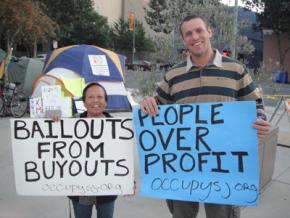Reports from Occupy: 12/1
The Occupy movement has spread from a small protest encampment in the financial district of Manhattan to a mass movement across the U.S.--and now the world--with supporters in over 1,000 cities, towns, campuses and more. Here, SocialistWorker.org is publishing reports we receive from activists around the country, describing the actions they're organizing and the discussions they're a part of. If you want to contribute a report, use this "Contact Us" page.
San Jose, Calif.
By Michael Chase
OCCUPY SAN Jose (OSJ) was ordered to pack up its encampment on November 16, shortly before midnight--received activists here a taste of what cities from New York to Oakland have delivered to their local encampments.
San Jose Mayor Chuck Reed--who, like so many others who have ordered crackdowns around the country, is a Democrat--used a recent court ruling as legal justification for shutting down encampments and thus depriving activists with a home base.
As the eviction was taking place, OSJ removed their gear peacefully, and there were no arrests. Roy, a disabled member of the encampment, decided to protest the lack of shelters for the homeless. Police seemed willing to leave him out in the cold until others from OSJ demanded he be given shelter for the night.
In late October, the San Jose Police Department conducted a series of raids over a five-day period to move the encampment from the plaza in front of City Hall. OSJ relocated across the street and remained there for three weeks until the latest police raid.

The response to the October raids demonstrated the substantial community support for the movement. A protest brought out 400 people, including a significant labor presence. This particular event challenged the 11 p.m. curfew. Just when the plaza was due to be cleared by police, a thousand cyclist arrived and filled the plaza in front of city hall.
During one of the October raids, Shawn O'Kelly eluded police and perched himself on top of a thirty foot wall in front of city hall. There he stayed for 22 days. O'Kelly, an experienced mountain climber, was making a statement in defense of the encampment and free speech.
Now that the encampment no longer exists, O'Kelly--or "Cracker" as he is known--decided to take a stand elsewhere: the mayor's residence. OSJ organized a flash mob and went to the mayor's home to support O'Kelly. The police arrived, but were at a loss as to what to do. There was no warrant on O'Kelly, so he was not arrested at the scene.
OSJ still gathers outside of City Hall, at the corner of Santa Clara and 4th, for General Assemblies and daily protests, and motorists honk their approval of the demonstrations. OSJ is printing its own newsletter, the San Jose Occupier, in Vietnamese and Spanish, as well as English.
SocialistWorker.org is regularly rounding up reports sent to us from around the country, describing the actions of the Occupy movement and the political discussions activists are having.News of the Occupy movement
Rochester, N.Y.
By Greg Morin
MORE THAN 30 people from Occupy Rochester and the Community Education Task Force marched from the occupation at Washington Square Park to the Rochester City School District (RCSD) building on November 29. There, they stopped the school board meeting for an over hour with rounds of mic checks and speeches.
As school board President Malik Evans began the meeting, he was mic checked, and three activists gave fiery speeches over the people's mic condemning the board's decision to use a corporate firm in a national search for a permanent replacement of former Superintendent Jean-Claude Brizard, who left to serve as CEO of the Chicago Public Schools. After Evans attempted a few times to speak over the speeches with no success, the majority of the school board walked out, with the audience chanting "Shame" as they left.
After waiting a bit for the school board members to return--none did--the group decided to occupy the school board's seats and meeting. Activists held their own meeting, discussing superintendent search and selection criteria that promotes community involvement, accountability and transparency, and that focuses on finding local candidates familiar with the problems that plague RCSD schools.
Evans and the head of security of the building informed participants in the ad-hoc meeting that they would be removed if people did not willingly leave immediately. Soon after, 10 Rochester police officers showed up and told the group they needed to leave or risk arrest. More officers were watching the building outside, along with 18 police vehicles, including a paddy wagon, all of which lined the street in front of the building. Eighteen of the activists remained in the room, standing in the middle and linking arms, refusing to leave before their meeting was done and their message was heard.
After a tense standoff, the police backed down, the activists returned to their original seats, and the school board began its meeting.


